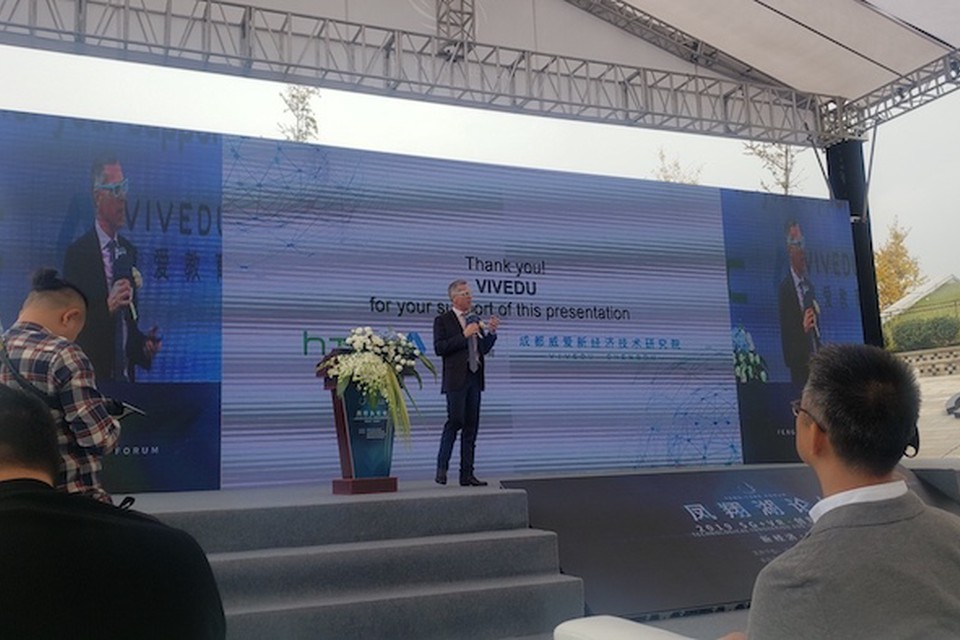Dean of the Tulane University School of Social Work Patrick Bordnick, PhD, LCSW, MPH partnered with Matt Vogl, MPH, Executive Director of the National Mental Health Innovation Center at the University of Colorado to give several keynote addresses at October’s World VR Conference in Nanchang City, China and the Feng Lake Forum in Chengdu, China. Leaders from governments, universities, research institutes, industrial associations, and enterprises shared information on virtual reality technology, trends, and applications as well as strengthened international cooperation and understanding. The event’s theme was “VR Adorns the World—VR + 5G Opens A New Era of Perception” and attracted over 1,500 attendees from around the world.
“Being able to participate in international conversations around the improvement of education, health, and wellbeing through cutting-edge technology is an honor,” said Bordnick. As a pioneer in the use of VR for substance abuse and behavioral disorder assessment and intervention as well as in the education field, Bordnick spoke to over 500 attendees at the VR Education Forum. His trip to China also included presenting at the 2019 Feng Lake Forum initiated by VIVEDU, a research institute focused on delivering education through immersive technology. Bordnick’s presentations addressed VR applications in health, behavioral health, and education. He highlighted how VR can be used by clinicians to teach coping mechanisms to those in substance abuse treatment, by therapists to help people with autism develop interpersonal skills, and by social work educators to simulate field scenarios for their students.
“Global collaboration to enhance VR’s use has the capacity to empower people wherever they are,” said Bordnick and Vogl. “We were happy to convey VR’s educational and behavioral health applications to other parts of the world and learn about advances that we can bring home to New Orleans and Denver to enhance our collaborations.”
As an added benefit, the trip provided the needed time for Bordnick and Vogl to set the foundations for joint partnerships between the National Mental Health Innovation Center and Tulane University School of Social Work to study the use of VR in clinical and education settings and, in turn, accelerate the pace at which new VR platforms can be deployed in real-world settings.
The Education Sub-form in which Bordnick and Vogl participated also included Wei Sun, General Manager of HTC VIVE Campus and Founder/CEO of VIVEDU, Hayes Mackaman, CEO of 8i, and Norman Wang, CEO of Glassbox Technologies, among other educators, researchers, and developers.
“Having Tulane represented at the world’s largest and most prestigious VR conference solidifies our position as a player on the world stage,” said Bordnick.
In addition to the participants, Bordnick was also impressed with the way the city promoted and supported the conference with building-sized LED signs, sculptures, choreographed drones, and a large talking robot much like a Transformer. Bordnick and Vogl were invited guests to the VR theme park, when they tested and experienced top-tier VR attractions.
Bordnick and Vogl stated they were “humbled by the honor of presenting. The cities of Nanchang and Chengdu welcomed us warmly. We are grateful for the experience and are looking forward to many years of joint collaborations.”
The international event was sponsored by China’s Ministry of Industry and Information Technology and the People’s Government of Jiangxi Province and organized the China Center for Information Industry Development, the Department of Industry and Information, Technology of Jiangxi Province, the Municipal People’s Government of Nanchang, and the Industry of Virtual Reality Alliance.
